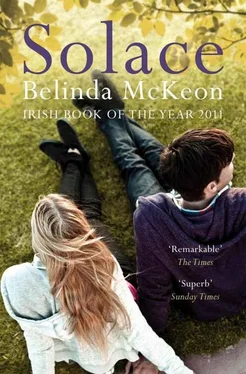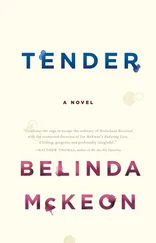Mark brought Aoife back from Longford with a cold, and that was their Christmas, nursing her through it and catching it themselves. Joanne had only a few days off from work, and she returned to the office more exhausted than she had been leaving it on Christmas Eve. She hoped they would send her home when they saw the state of her — the red nose, the streaming eyes, the scarf muffled around her throat, the scraggy tissues tucked in her cuffs — but they did not. There was too much to do. Instead, they all caught the cold too, and blamed Joanne.
With the new term in Trinity, Mark began to teach a second class. It was on something more closely related to his thesis, something into which a couple of Edgeworth’s novels fitted, and he was glad about that. And though the pay was meagre, the extra money was good to have. While he was teaching, Mark left Aoife with Eileen, the woman who ran a dressmaker’s shop in the house next door. She refused to take any money. It was only a couple of hours, she told him, and she would be more than happy to have Aoife for the whole week if he wanted to go off and work at a proper job. Joanne had roared with laughter when Mark told her the story that evening, and he had laughed too, but in a different way. A couple of days later, he had brought up once more an idea that he had aired several times since Aoife’s birth. He thought he should look around for a second job, he said, something that would help them to be more secure. They were always talking, he reminded her, about how they needed to start up a savings account for Aoife.
Joanne shook her head. ‘Yes, but you don’t have to get a second job for us to do that. We should do that anyway. Even if we only put a tenner a week into it, we should be doing it now.’
‘But a tenner a week is going to get us nowhere.’
‘It won’t always be that little,’ she said. ‘I’m saying that the point is to save, not to wait until we might have more to save. And, anyway, we’ve talked about this before. If you work full-time too, the cost of putting her in a crèche is probably going to cost us double what you earn.’
Mark gestured to the door. ‘But Eileen says—’
‘Come on, Mark. We’re not going to leave her in a dressmaker’s shop all day. That’s not going to work. It’s probably not even safe to leave her in there as little as we do. As soon as she starts crawling, we’re going to have to find somehere else. Eileen might have reared her kids among pins and scissors and plastic bags, but we’re not going to.’
‘She doesn’t leave her in the shop the whole time.’
‘She leaves her by herself?’
‘She leaves the door open between the shop and her sitting room.’
‘We’re going to have to get someone to come here and mind her while you’re teaching,’ Joanne said. ‘Could you see if one of your students will do it for a few quid?’
Mark exhaled in loud protest. ‘I don’t want any of my bloody students poking around my own house. They look down their fucking noses at me enough as it is.’
‘What’s wrong with this house?’
‘I didn’t mean that,’ Mark said tiredly, and he shook his head. ‘I don’t want to have this conversation now. I’m too knackered after work.’
Joanne opened her mouth to respond, but she left it. There was no point. It would collapse into an argument and they would go to bed in a cloud of irritation and resentment. She did not want that. She did not want to bring that into the room they shared with Aoife. She wanted nothing to press in on her sleeping child; nothing but her dreams.
They did not argue often. Usually, in the evenings, they were almost too tired to talk. Usually they watched television until bedtime, or Joanne went online and looked at gossip sites and discussion forums, or Mark read his students’ essays and sighed and cursed and clicked his tongue as he scrawled all through their pages in indignant red pen.
Joanne tried to read. There were novels she wanted to get through. They had been sitting on her bedside table since the final months of the pregnancy. She brought one down to the sitting room occasionally and sat with it for a while, but the paragraphs seemed to dissolve as she read them; she kept needing to go back to the start. Or the television would distract her, or she would think of something she had been meaning to look up on the Internet, and she would put the book aside. She always meant to get back to it. She always took it back upstairs with her and tried to read it in bed. That lasted for about the length of time it took for her eyelids to blink once, then again, and then to close.
Mark did not fare much better, but most evenings he sat for a while with a book, looking at it, writing in its margin with a pencil. He said he could not work otherwise; that he could not absorb the information. So he scribbled, and annotated, and underlined, and while he read he frowned and squinted in a way that she told him was certain to damage his eyes.
‘No, that’s something else,’ he always joked when she said that, and she always told him he was hilarious.
One night when he had fallen asleep on the couch with a book in his lap she reached over and took it from him. It was one of Edgeworth’s, the only one Joanne had heard of. Castle Rackrent. She did not know why she had heard of it: she had not read it. It had never been assigned to her in school or in university, and she had never come across it by herself. She should read it, she thought; she should know more about Mark’s writer. Besides, it was set around Edgeworthstown. It might be interesting. It might be just the thing to help her to concentrate again.
She fought the impulse to skip the introduction; there could be something in it, she told herself, that she needed to know. She read Edgeworth’s birth date, her death date; she did the calculation in her head. Eighty-two. A great age, she thought, and realized that those were her father’s words, the words he had often used to describe someone who was old. You didn’t say they were old; you said they were a great age. And when they were dead, you said that they had lived to a great age. That was a way of saying it was no big deal that they were gone. That they’d hung on for long enough. That their family had nothing to be crying about. That crying over such a death, at such an age, was just a little bit rich. Joanne’s father had been fifty-eight when he died. That had not been a great age.
She skimmed the next paragraph; it mentioned the American revolution. It mentioned the French one. It mentioned Rousseau. Then she read the line about how Edgeworth’s father had employed her to write his business letters, to help him deal with his tenants and listen to their pleas, and she read it again, and then with Mark’s pencil she placed a little exclamation mark in the margin beside it. She skimmed on through the dates and the placenames and the titles of books, and she read a couple of lines about Scott, and she read about how Edgeworth did her writing in her sitting room with a crowd of children playing all around her. She underlined that part and gave it an exclamation mark as well. You think you have it tough , she wrote, beneath the exclamation mark, and she could not help it, she laughed to herself. She looked over to Mark where he slept, and wanted to wake him, to show him what she had done, to enjoy the joke with him there and then, but she left him sleeping. She left the joke for him to find for himself, some time when he would go back over the book, some time when he would find her writing in the margin and stare at it for a moment and then laugh. And when she would come in from work that evening, or when he would come in to her, he would ask her, in a voice pretending sternness, to guess what he had found. And she would have forgotten about it then, and they would laugh about it, and they would kiss. She thumbed forward twenty or thirty pages, into the novel itself. She wanted to leave him something else to find. She glanced at a paragraph: it was something about a house being full of people and heat and smoke, something about a man hiding in a bed. On the facing margin, Mark had left a note in pencil himself. Anecdote , he had written. Effect of the Real. Beside it, Joanne wrote, HELLO BABY . She put two X marks underneath. Jesus, she thought then, looking at the words, you’re acting like an idiot. You need to go to bed. She closed the book, left it back on the couch beside Mark, and stood up, stretched and loudly yawned. At the noise, Mark opened his eyes as though in fright.
Читать дальше












